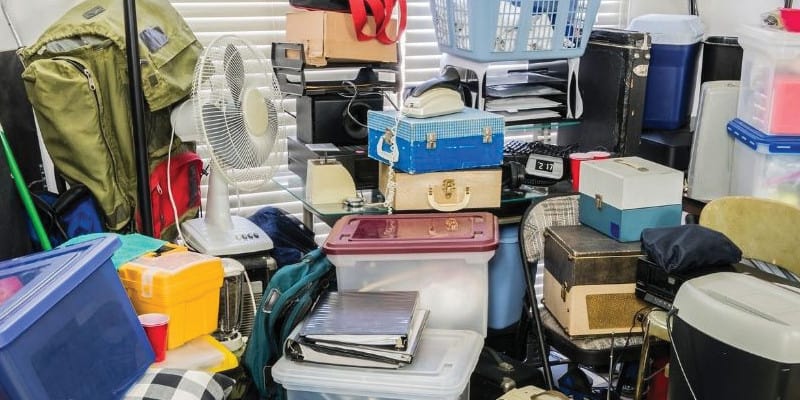According to Hoarding Disorders UK, around four per cent of the UK population is affected by hoarding disorder.
The condition is recognised by the NHS and can have a significant impact on the hoarder themselves, neighbours, housing colleagues and housing providers. At Yorkshire Housing, we’ve found it’s a growing problem, one that’s been made worse by the pandemic. Last year we dealt with 16 cases, this year we’ve already seen 11 and we’re only into May.
The risks of hoarding
Hoarding can pose a real risk to customers living in and around our homes. Getting in and out and moving around the home can become unsafe. There’s an increased fire risk because of the number of items being stored, and portable heaters and extension cables that are being used nearby can also increase the risk of fires.
Hoarding can also cause damage to the home and contribute to pest control issues. This can overflow into communal areas and gardens posing health and safety risks for neighbours. If rooms are used for hoarding and not as intended, such as a bathtub used to store items, people can’t wash, leading to self-neglect. Housing providers also face difficulties accessing homes for important visits such as repairs and gas safety checks.
Hard to report
Reporting hoarding is traditionally an expensive paper-based exercise. It’s a lengthy process that involves taking notes while visiting a customer’s home. Notes are then manually updated into a case management system or attached as a file to an existing case, all of which takes time and prevents customers accessing support and help quickly. It’s this lack of efficiency and speed that led us to develop our sector’s first hoarding app.
Technology can almost always make processes more efficient, improving products and services and delivering a better experience for our customers. Our goal was to use the systems and technologies we already have at Yorkshire Housing to digitalise the hoarding reporting process; speeding up access to support, reducing health and safety risks, and encouraging more colleagues to speak up and raise their concerns.
Yorkshire Housing’s hackathons
Thomas Edison famously said, “There’s a better way to do it, find it.” Our innovation team is always looking at how technology can improve our services, with the team holding regular ‘hackathons’ to bring together innovation analysts, developers and other IT specialists to problem-solve and create cutting-edge solutions.
It was during one of these hackathons that our team came up with the idea of using Power Apps to streamline how our colleagues carry out inspections and report concerns. The team decided to create two options for reporting hoarding, a ‘report a concern’ function and a ‘full assessment’ tool.
The ‘report a concern’ function is a stripped-back version of the full assessment that focuses on five key areas around safety, specifically access to the customer’s home and access to facilities such as gas and electricity. This new process allows colleagues on time-sensitive visits, such as engineers and contractors, to report concerns about hoarding quickly and easily, something that wasn’t possible with the old system.
Prototype app
For both the ‘report a concern’ and ‘full assessment’ tools, the app uses a score-based system for each question to grade the risk. The app then automatically sends a report to our customer independence team where the reports are triaged. If concerns have been reported, we can quickly arrange a visit to the customer’s home to carry out a more in-depth assessment.
The app also allows colleagues to view previous inspection reports and use these to show how cases are being progressed. Spotting an escalating situation quickly means we can intervene much earlier.
After we’d built a prototype app, we presented it to our safeguarding committee to get their feedback. Kayley Hymen from Holistic Hoarding, who has worked with mental health and housing providers for over ten years, was at our presentation and loved what we had created. It was important for us to use her expertise to help develop a great product that would make a real difference to our customer’s lives. After some further development, the app was rolled out to a group of our colleagues.
Hoarding is massively under-reported in the UK. Doing nothing is not an option; hoarding shouldn’t be treated as anti-social behaviour, instead we should treat it like any other mental health issue, with the appropriate levels of support.
It’s in the interest of housing providers and our management teams to recognise that hoarding is happening among our tenant populations and spend time and effort into developing solutions that will reduce the risks to customers and our operations.
John Smart is an innovation analyst at Yorkshire Housing.


